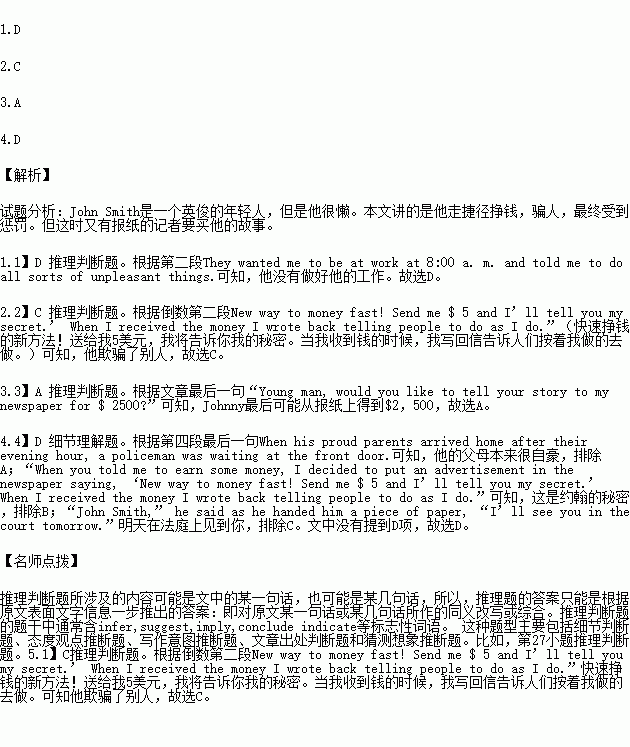题目内容
John Smith was a very handsome young man but he was lazy. He had finished his education and was happy to sit in his room and listen to the radio all day long. In fact, he had been doing nothing for almost six months, which worried his father a lot. One day Mr. Smith decided that he had to do something. “Johnny, When I was your age I was working and supporting my ten brothers and sisters. I want you to go out and get a job.” So that was what he did. In fact, in the next three months, Johnny started ten jobs and was fired from ten jobs. He explained to his father.
“They wanted me to be at work at 8:00 a. m. and told me to do all sorts of unpleasant things.”
“I don’t care how you do it,” Mr. Smith said. “Either you earn some money or move out of the house. I gave you one week’s time.”
In the next few days Johnny began to change. He still stayed in his room all day, but spent his time writing letters and reading through the newspapers. More and more posts began to arrive for him. He bought a new suit for himself and invited his parents to the theatre and for dinner afterwards at the most expensive restaurant in town. When his proud parents arrived home after their evening hour, a policeman was waiting at the front door.
“John Smith,” he said as he handed him a piece of paper, “I’ll see you in the court tomorrow.”
When he got outside, Johnny told his parents everything. “When you told me to earn some money, I decided to put an advertisement in the newspaper saying, ‘New way to money fast! Send me $ 5 and I’ll tell you my secret.’ When I received the money I wrote back telling people to do as I do.”
Johnny was fined $250 by the court and was ordered to pay all the people back. As he left the court house feeling very ashamed, a newspaper man came up to him, “Young man, would you like to tell your story to my newspaper for $2,500?”
1.Johnny was fired from the jobs because _______.
A. he liked listening to the radio
B. he had a big family to support
C. he spent a lot of time writing letters
D. he didn’t do the jobs well
2.Why was Johnny fined $ 250?
A. Because he was lazy.
B. Because he was out of work.
C. Because he cheated the people.
D. Because he didn’t pay for his new suit.
3.What would probably happen at last?
A. Johnny would get $2,500 from the newspaper.
B. The court would give $ 250 back to Johnny.
C. Johnny would continue to advertise in the newspaper.
D. Johnny would become a newspaper reporter.
4.Which of the following is NOT mentioned in the passage?
A. How did the parents feel when Johnny invited them to the theatre and dinner.
B. What’s Johnny’s secret.
C. What did the policeman want Johnny to do.
D. How much did Johnny have to pay all the people back.

